ASA Remote Access VPN with OCSP Verification under Microsoft Windows 2012 and OpenSSL
Available Languages
Contents
Introduction
This document describes how to use Online Certificate Status Protocol (OCSP) validation on a Cisco Adaptive Security Appliance (ASA) for certificates presented by VPN users. Example configurations for two OCSP servers (Microsoft Windows Certificate Authority [CA] and OpenSSL) are presented. The Verify section describes detailed flows on the packet level, and the Troubleshoot section focuses on typical errors and problems.
Prerequisites
Requirements
Cisco recommends that you have knowledge of these topics:
- Cisco Adaptive Security Appliance command-line interface (CLI) configuration and Secure Socket Layer (SSL) VPN configuration
- X.509 certificates
- Microsoft Windows Server
- Linux/OpenSSL
Components Used
The information in this document is based on these software and hardware versions:
- Cisco Adaptive Security Appliance software, version 8.4 and later
- Microsoft Windows 7 with Cisco AnyConnect Secure Mobility Client, Release 3.1
- Microsoft Server 2012 R2
- Linux with OpenSSL 1.0.0j or later
The information in this document was created from the devices in a specific lab environment. All of the devices used in this document started with a cleared (default) configuration. If your network is live, make sure that you understand the potential impact of any command.
Configure
Network Diagram
The client uses remote access VPN. This access can be Cisco VPN Client (IPSec), Cisco AnyConnect Secure Mobility (SSL/Internet Key Exchange Version 2 [IKEv2]), or WebVPN (portal). In order to log in, the client provides the correct certificate, as well as the username/password that were configured locally on the ASA. The client certificate is validated via the OCSP server.
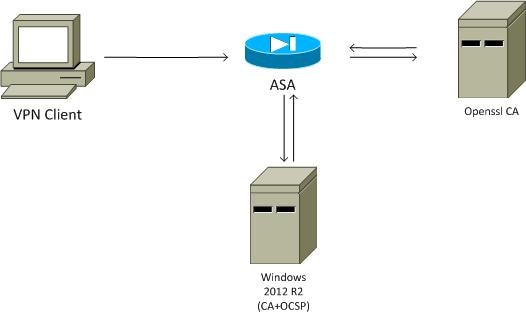
ASA Remote Access with OCSP
The ASA is configured for SSL access. The client is using AnyConnect in order to login. The ASA uses Simple Certificate Enrollment Protocol (SCEP) in order to request the certificate:
crypto ca trustpoint WIN2012
revocation-check ocsp
enrollment url http://10.147.25.80:80/certsrv/mscep/mscep.dll
crypto ca certificate map MAP 10
subject-name co administrator
A certificate map is created in order to identify all users whose subject-name contains the word administrator (case insensitive). Those users are bound to a tunnel-group named RA:
webvpn
enable outside
anyconnect image disk0:/anyconnect-win-3.1.02040-k9.pkg 1
anyconnect enable
tunnel-group-list enable
certificate-group-map MAP 10 RA
The VPN configuration requires successful authorization (that is, a validated certificate). It also requires the correct credentials for the locally defined username (authentication aaa):
username cisco password xxxxxxx
ip local pool POOL 192.168.11.100-192.168.11.105 mask 255.255.255.0
aaa authentication LOCAL
aaa authorization LOCAL
group-policy MY internal
group-policy MY attributes
vpn-tunnel-protocol ikev1 ikev2 l2tp-ipsec ssl-client ssl-clientless
tunnel-group RA type remote-access
tunnel-group RA general-attributes
address-pool POOL
default-group-policy MY
authorization-required
tunnel-group RA webvpn-attributes
authentication aaa certificate
group-alias RA enable
Microsoft Windows 2012 CA
Services Installation
This procedure describes how to configure role services for the Microsoft server:
- Navigate to Server Manager > Manage > Add Roles and Features. The Microsoft server needs these role services:
- Certification Authority
- Certification Authority Web Enrollment, which is used by the client
- Online Responder, which is needed for OCSP
- Network Device Enrollment Service, which contains the SCEP application used by the ASA
Web service with policies can be added if needed.
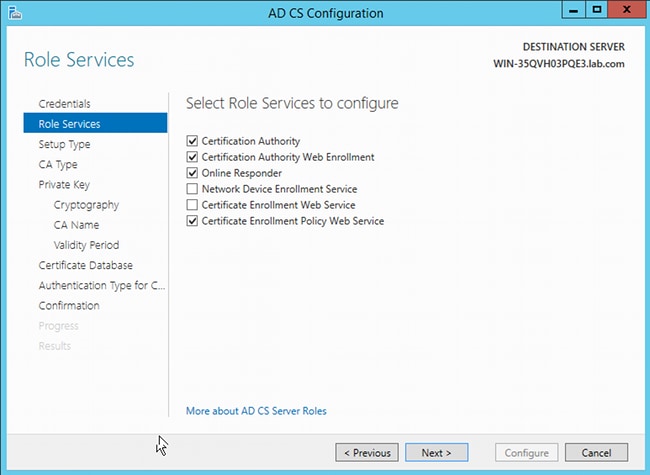 It is not possible to add all the roles at the same time; for example, Network Device Enrollment Service (NDES) must be added later.
It is not possible to add all the roles at the same time; for example, Network Device Enrollment Service (NDES) must be added later.
- When you add features, be sure to include Online Responder Tools because it includes an OCSP snap-in that is used later:
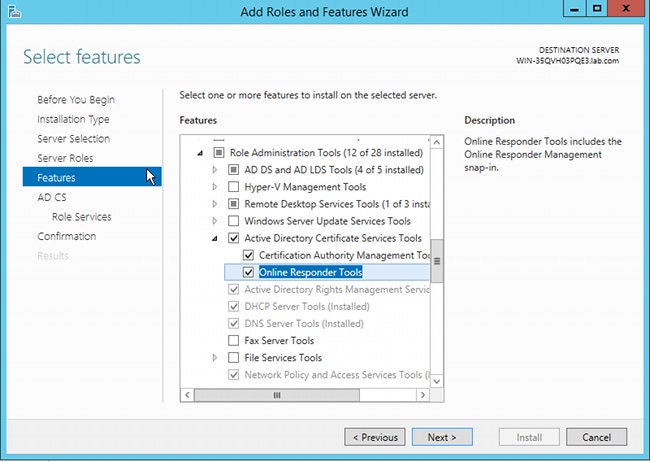
CA Configuration for OCSP Template
The OCSP service uses a certificate to sign the OCSP response. A special certificate on the Microsoft server must be generated and must include:
- Extended key usage = OCSP signing
- OCSP no revocation checking
This certificate is needed in order to prevent OCSP validation loops. ASA does not use the OCSP service to try to check the certificate presented by the OCSP service.
- Add a template for the certificate on the CA. Navigate to CA > Certificate Template > Manage, select OCSP Response Signing, and duplicate the template. View the properties for the newly created template, and click the Security tab. The permissions describe which entity is allowed to request a certificate that uses that template, so correct permissions are required. In this example, the entity is the OCSP service that is running on the same host (TEST-CISCO\DC), and the OCSP service needs Autoenroll privileges:
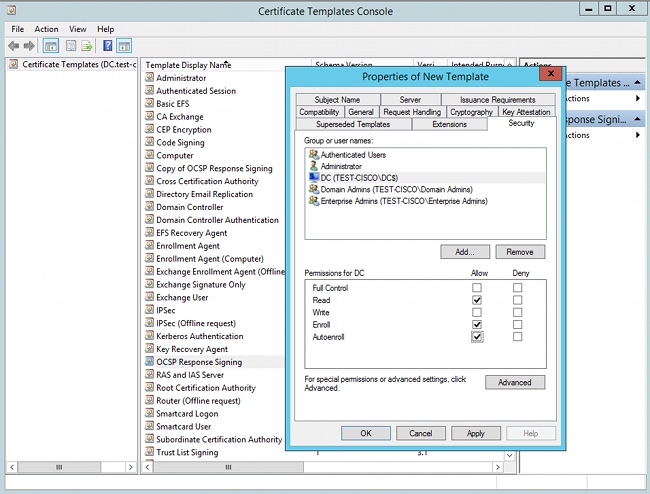
All other settings for the template can be set to default. - Activate the template. Navigate to CA > Certificate Template > New > Certificate Template to Issue, and select the duplicate template:
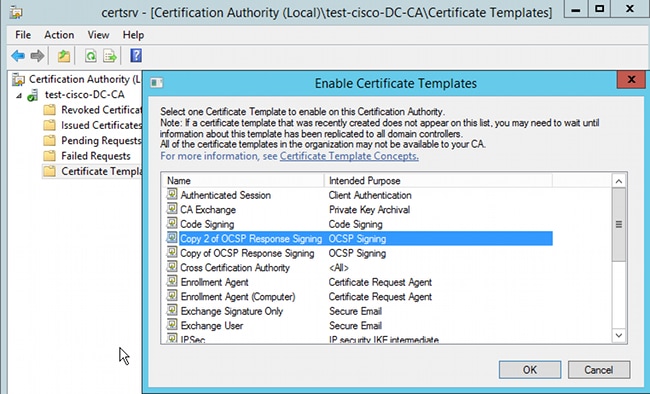
OCSP Service Certificate
This procedure describes how to use Online Configuration Management in order to configure OCSP:
- Navigate to Server Manager > Tools.
- Navigate to Revocation Configuration > Add Revocation Configuration in order to add a new configuration:
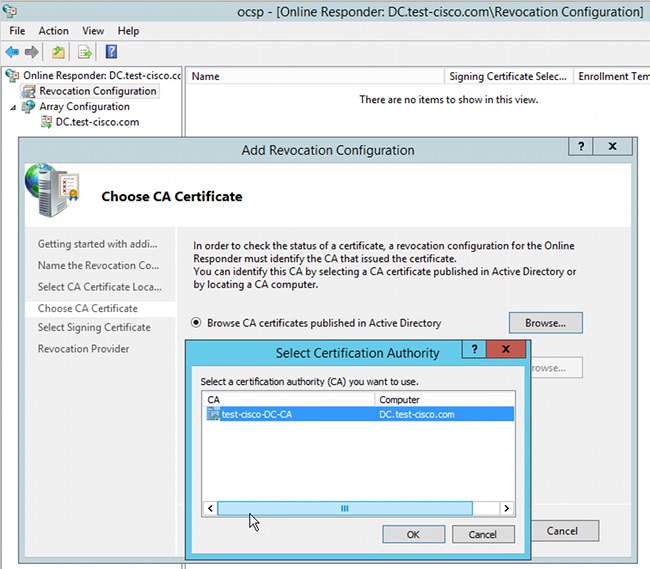
OCSP can use the same Enterprise CA. The certificate for OCSP service is generated. - Use the selected Enterprise CA, and choose the template created earlier. The certificate is enrolled automatically:
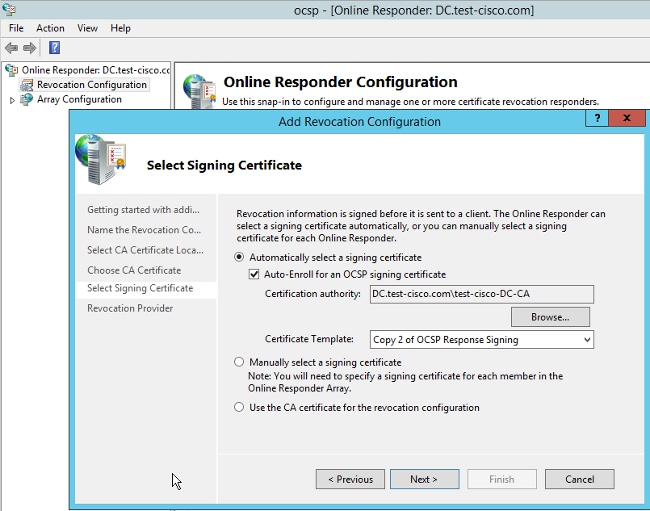
- Confirm that the certificate is enrolled and its status is Working/OK:

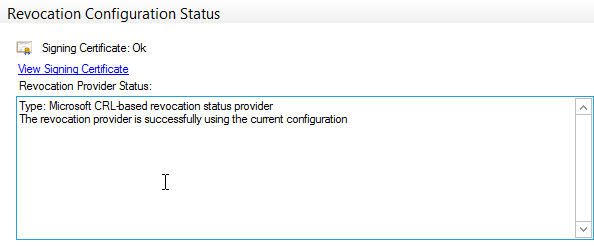
- Navigate to CA > Issued Certificates in order to verify the certificate details:
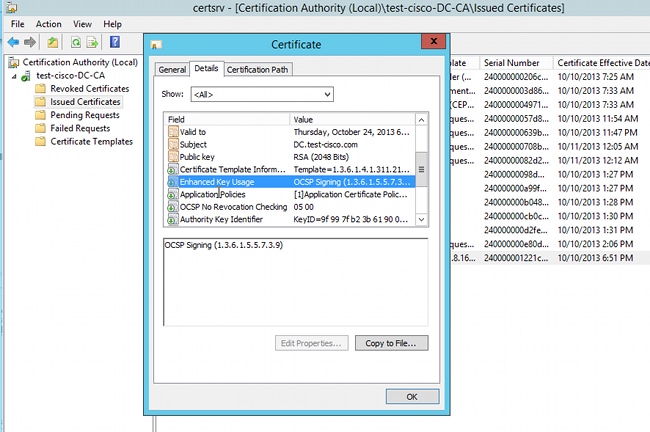
OCSP Service Nonces
Microsoft implementation of OCSP is compliant with RFC 5019 The Lightweight Online Certificate Status Protocol (OCSP) Profile for High-Volume Environments , which is a simplified version of RFC 2560 X.509 Internet Public Key Infrastructure Online Certificate Status Protocol - OCSP .
The ASA uses RFC 2560 for OCSP. One of the differences in the two RFCs is that RFC 5019 does not accept signed requests sent by ASA.
It is possible to force the Microsoft OCSP service to accept those signed requests and reply with the correct signed response. Navigate to Revocation Configuration > RevocationConfiguration1 > Edit Properties, and select the option to Enable NONCE extension support.
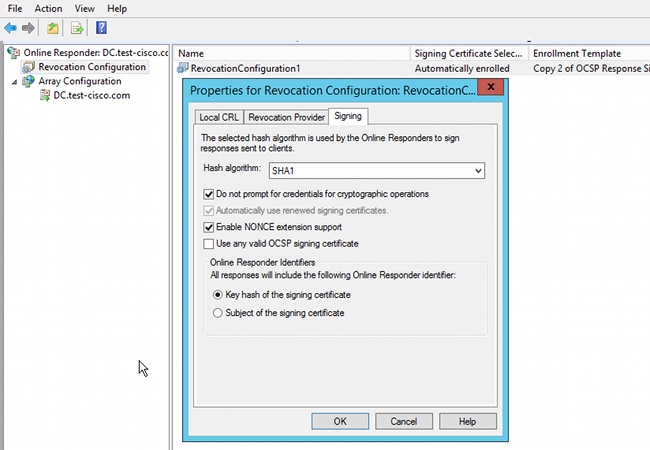
The OCSP service is now ready to use.
Although Cisco does not recommend this, nonces can be disabled on the ASA:
BSNS-ASA5510-3(config-ca-trustpoint)# ocsp disable-nonce
CA Configuration for OCSP Extensions
You must now reconfigure the CA to include the OCSP server extension in all issued certificates. The URL from that extension is used by ASA in order to connect to the OCSP server when a certificate is validated.
- Open the Properties dialog box for the server on the CA.
- Click the Extensions tab. The Authority Information Access (AIA) extension that points to the OCSP service is needed; in this example, it is http://10.61.208.243/ocsp. Enable both of these options for the AIA extension:
- Include in the AIA extension of issued certificates
- Include in the online certificate status protocol (OCSP) extension
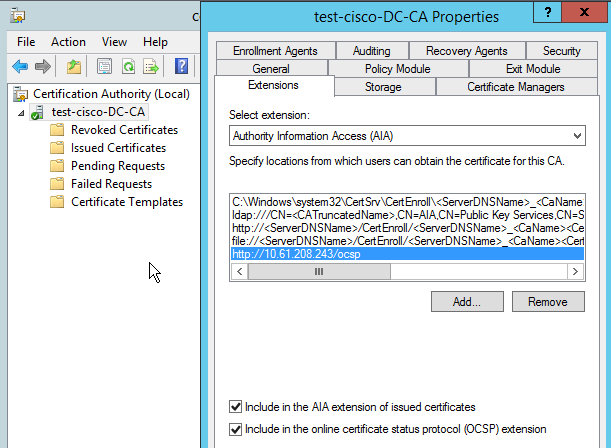
This ensures that all issued certificates have a correct extension that points to the OCSP service.
OpenSSL
This example assumes that the OpenSSL server is already configured. This section describes only the OCSP configuration and changes that are needed for CA configuration.
This procedure describes how to generate the OCSP certificate:
- These parameters are needed for the OCSP responder:
[ OCSPresponder ]
basicConstraints = CA:FALSE
keyUsage = nonRepudiation, digitalSignature, keyEncipherment
extendedKeyUsage = OCSPSigning - These parameters are needed for user certificates:
[ UserCerts ]
authorityInfoAccess = OCSP;URI:http://10.61.208.243 - Certificates need to be generated and signed by the CA.
- Start the OCSP server:
openssl ocsp -index ourCAwebPage/index.txt -port 80 -rsigner
ocspresponder.crt -rkey ocspresponder.key -CA cacert.crt -text -out
log.txt - Test the example certificate:
openssl ocsp -CAfile cacert.crt -issuer cacert.crt -cert example-cert.crt
-url http://10.61.208.243 -resp_text
More examples are available on the OpenSSL web site .
OpenSSL, like ASA, supports OCSP nonces; the nonces can be controlled with use of the -nonce and -no_nonce switches.
ASA with Multiple OCSP Sources
The ASA can override the OCSP URL. Even if the client certificate contains an OCSP URL, it is overwritten by the configuration on the ASA:
crypto ca trustpoint WIN2012
revocation-check ocsp
enrollment url http://10.61.209.83:80/certsrv/mscep/mscep.dll
ocsp url http://10.10.10.10/ocsp
The OCSP server address can be defined explicitly. This command example matches all certificates with administrator in subject name, uses an OPENSSL trustpoint in order to validate OCSP signature, and uses the URL of http://11.11.11.11/ocsp in order to send the request:
crypto ca trustpoint WIN2012
revocation-check ocsp
enrollment url http://10.61.209.83:80/certsrv/mscep/mscep.dll
match certificate MAP override ocsp trustpoint OPENSSL 10 url
http://11.11.11.11/ocsp
crypto ca certificate map MAP 10
subject-name co administrator
The order used to find OCSP URL is:
- An OCSP server you set with the match certificate command
- An OCSP server you set with the ocsp url command
- The OCSP server in the AIA field of the client certificate
ASA with OCSP Signed by Different CA
An OCSP response can be signed by a different CA. In such a case, it is necessary to use the match certificate command in order to use a different trustpoint on the ASA for OCSP certificate validation.
crypto ca trustpoint WIN2012
revocation-check ocsp
enrollment url http://10.61.209.83:80/certsrv/mscep/mscep.dll
match certificate MAP override ocsp trustpoint OPENSSL 10 url
http://11.11.11.11/ocsp
crypto ca certificate map MAP 10
subject-name co administrator
crypto ca trustpoint OPENSSL
enrollment terminal
revocation-check none
In this example, the ASA uses the OCSP URL rewrite for all certificates with a subject-name that contains administrator. The ASA is forced to validate the OCSP responder certificate against another trustpoint, OPENSSL. User certificates are still validated in the WIN2012 trustpoint.
Since the OCSP responder certificate has the 'OCSP no revocation checking' extension, the certificate is not verified, even when OCSP is forced to validate against the OPENSSL trustpoint.
By default, all trustpoints are searched when the ASA is trying to verify the user certificate. Validation for the OCSP responder certificate is different. The ASA searches only the trustpoint that has already been found for the user certificate (WIN2012 in this example).
Thus, it is necessary to use the match certificate command in order to force the ASA to use a different trustpoint for OCSP certificate validation (OPENSSL in this example).
User certificates are validated against the first matched trustpoint (WIN2012 in this example), which then determines the default trustpoint for OCSP responder validation.
If no specific trustpoint is provided in the match certificate command, the OCSP certificate is validated against the same trustpoint as the user certificates (WIN2012 in this example).:
crypto ca trustpoint WIN2012
revocation-check ocsp
enrollment url http://10.61.209.83:80/certsrv/mscep/mscep.dll
match certificate MAP override ocsp 10 url http://11.11.11.11/ocsp
Verify
Use this section to confirm that your configuration works properly.
ASA - Get Certificate via SCEP
This procedure describes how to obtain the certificate through use of SCEP:
- This is the trustpoint authentication process to get the CA certificate:
debug crypto ca
debug crypto ca messages
debug crypto ca transaction
BSNS-ASA5510-3(config-ca-crl)# crypto ca authenticate WIN2012
Crypto CA thread wakes up!
CRYPTO_PKI: Sending CA Certificate Request:
GET /certsrv/mscep/mscep.dll/pkiclient.exe?operation=GetCACert&message=
WIN2012 HTTP/1.0
Host: 10.61.209.83
CRYPTO_PKI: http connection opened
INFO: Certificate has the following attributes:
Fingerprint: 27dda0e5 e1ed3f4c e3a2c3da 6d1689c2
Do you accept this certificate? [yes/no]:
% Please answer 'yes' or 'no'.
Do you accept this certificate? [yes/no]:
yes
Trustpoint CA certificate accepted. - In order to request the certificate, the ASA needs to have a one-time SCEP password that can be obtained from the admin console at http://IP/certsrv/mscep_admin:

- Use that password to request the certificate on the ASA:
BSNS-ASA5510-3(config)# crypto ca enroll WIN2012
Some output has been omitted for clarity.
%
% Start certificate enrollment ..
% Create a challenge password. You will need to verbally provide this
password to the CA Administrator in order to revoke your certificate.
For security reasons your password will not be saved in the
configuration.
Please make a note of it.
Password: ****************
Re-enter password: ****************
% The fully-qualified domain name in the certificate will be:
BSNS-ASA5510-3.test-cisco.com
% Include the device serial number in the subject name? [yes/no]: yes
% The serial number in the certificate will be: JMX1014K16Y
Request certificate from CA? [yes/no]: yes
% Certificate request sent to Certificate Authority
BSNS-ASA5510-3(config)#
CRYPTO_PKI: Sending CA Certificate Request:
GET /certsrv/mscep/mscep.dll/pkiclient.exe?operation=GetCACert&message=
WIN2012 HTTP/1.0
Host: 10.61.209.83
CRYPTO_PKI: http connection opened
CRYPTO_PKI: Found a subject match - inserting the following cert record
into certList - Verify both the CA and ASA certificates:
BSNS-ASA5510-3(config)# show crypto ca certificates
The ASA does not display most of the certificate extensions. Even though the ASA certificate contains the 'OCSP URL in AIA' extension, the ASA CLI does not present it. Cisco Bug ID CSCui44335, "ASA ENH Certificate x509 extensions displayed," requests this enhancement.
Certificate
Status: Available
Certificate Serial Number: 240000001cbf2fc89f44fe819700000000001c
Certificate Usage: General Purpose
Public Key Type: RSA (1024 bits)
Signature Algorithm: SHA1 with RSA Encryption
Issuer Name:
cn=test-cisco-DC-CA
dc=test-cisco
dc=com
Subject Name:
hostname=BSNS-ASA5510-3.test-cisco.com
serialNumber=JMX1014K16Y
CRL Distribution Points:
[1] ldap:///CN=test-cisco-DC-CA,CN=DC,CN=CDP,
CN=Public%20Key%20Services,CN=Services,CN=Configuration,
DC=test-cisco,DC=com?certificateRevocationList?base?objectClass=
cRLDistributionPoint
Validity Date:
start date: 11:02:36 CEST Oct 13 2013
end date: 11:02:36 CEST Oct 13 2015
Associated Trustpoints: WIN2012
CA Certificate
Status: Available
Certificate Serial Number: 3d4c0881b04c799f483f4bbe91dc98ae
Certificate Usage: Signature
Public Key Type: RSA (2048 bits)
Signature Algorithm: SHA1 with RSA Encryption
Issuer Name:
cn=test-cisco-DC-CA
dc=test-cisco
dc=com
Subject Name:
cn=test-cisco-DC-CA
dc=test-cisco
dc=com
Validity Date:
start date: 07:23:03 CEST Oct 10 2013
end date: 07:33:03 CEST Oct 10 2018
Associated Trustpoints: WIN2012
AnyConnect - Get Certificate via Web Page
This procedure describes how to obtain the certificate through use of the web browser on the client:
- An AnyConnect user certificate can be requested through the webpage. On the client PC, use a web browser to go to the CA at http://IP/certsrv:
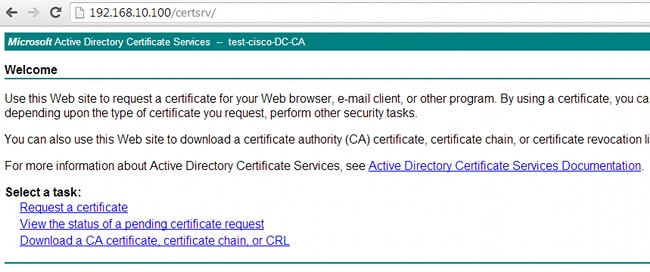
- The user certificate can be saved in the web browser store, then exported to the Microsoft store, which is searched by AnyConnect. Use certmgr.msc in order to verify the received certificate:
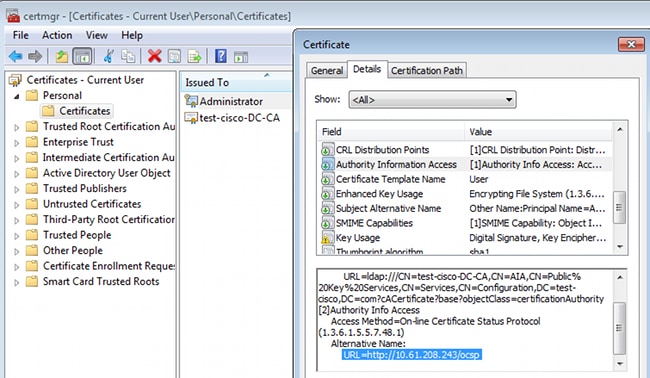
AnyConnect can also request the certificate as long as there is a correct AnyConnect profile.
ASA VPN Remote Access with OCSP Validation
This procedure describes how to check OCSP validation:
- As it attempts to connect, the ASA reports that the certificate is being checked for OCSP. Here, the OCSP signing certificate has a no-check extension and has not been checked via OCSP:
debug crypto ca
Some output has been omitted for clarity.
debug crypto ca messages
debug crypto ca transaction
%ASA-6-725001: Starting SSL handshake with client outside:
10.61.209.83/51262 for TLSv1 session.
%ASA-7-717025: Validating certificate chain containing 1 certificate(s).
%ASA-7-717029: Identified client certificate within certificate chain.
serial number: 240000001B2AD208B12811687400000000001B, subject name:
cn=Administrator,cn=Users,dc=test-cisco,dc=com.
Found a suitable trustpoint WIN2012 to validate certificate.
%ASA-7-717035: OCSP status is being checked for certificate. serial
number: 240000001B2AD208B12811687400000000001B, subject name:
cn=Administrator,cn=Users,dc=test-cisco,dc=com.
%ASA-6-302013: Built outbound TCP connection 1283 for outside:
10.61.209.83/80 (10.61.209.83/80) to identity:10.48.67.229/35751
(10.48.67.229/35751)
%ASA-6-717033: CSP response received.
%ASA-7-717034: No-check extension found in certificate. OCSP check
bypassed.
%ASA-6-717028: Certificate chain was successfully validated with
revocation status check. - The end user provides the user credentials:
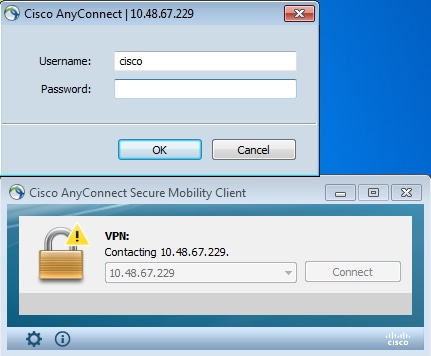
- The VPN session is finished correctly:
%ASA-7-717036: Looking for a tunnel group match based on certificate maps
for peer certificate with serial number:
240000001B2AD208B12811687400000000001B, subject name: cn=Administrator,
cn=Users,dc=test-cisco,dc=com, issuer_name: cn=test-cisco-DC-CA,
dc=test-cisco,dc=com.
%ASA-7-717038: Tunnel group match found. Tunnel Group: RA, Peer
certificate: serial number: 240000001B2AD208B12811687400000000001B,
subject name: cn=Administrator,cn=Users,dc=test-cisco,dc=com,
issuer_name: cn=test-cisco-DC-CA,dc=test-cisco,dc=com.
%ASA-6-113012: AAA user authentication Successful : local database :
user = cisco
%ASA-6-113009: AAA retrieved default group policy (MY) for user = cisco
%ASA-6-113039: Group <MY> User <cisco> IP <10.61.209.83> AnyConnect parent
session started. - The session is created:
BSNS-ASA5510-3(config)# show vpn-sessiondb detail anyconnect
Session Type: AnyConnect Detailed
Username : cisco Index : 4
Assigned IP : 192.168.11.100 Public IP : 10.61.209.83
Protocol : AnyConnect-Parent SSL-Tunnel DTLS-Tunnel
License : AnyConnect Premium
Encryption : AnyConnect-Parent: (1)none SSL-Tunnel: (1)RC4
DTLS-Tunnel: (1)AES128
Hashing : AnyConnect-Parent: (1)none SSL-Tunnel: (1)SHA1
DTLS-Tunnel: (1)SHA1
Bytes Tx : 10540 Bytes Rx : 32236
Pkts Tx : 8 Pkts Rx : 209
Pkts Tx Drop : 0 Pkts Rx Drop : 0
Group Policy : MY Tunnel Group : RA
Login Time : 11:30:31 CEST Sun Oct 13 2013
Duration : 0h:01m:05s
Inactivity : 0h:00m:00s
NAC Result : Unknown
VLAN Mapping : N/A VLAN : none
AnyConnect-Parent Tunnels: 1
SSL-Tunnel Tunnels: 1
DTLS-Tunnel Tunnels: 1
AnyConnect-Parent:
Tunnel ID : 4.1
Public IP : 10.61.209.83
Encryption : none Hashing : none
TCP Src Port : 51401 TCP Dst Port : 443
Auth Mode : Certificate and userPassword
Idle Time Out: 30 Minutes Idle TO Left : 29 Minutes
Client OS : Windows
Client Type : AnyConnect
Client Ver : Cisco AnyConnect VPN Agent for Windows 3.1.02040
Bytes Tx : 5270 Bytes Rx : 788
Pkts Tx : 4 Pkts Rx : 1
Pkts Tx Drop : 0 Pkts Rx Drop : 0
SSL-Tunnel:
Tunnel ID : 4.2
Assigned IP : 192.168.11.100 Public IP : 10.61.209.83
Encryption : RC4 Hashing : SHA1
Encapsulation: TLSv1.0 TCP Src Port : 51406
TCP Dst Port : 443 Auth Mode : Certificate and
userPassword
Idle Time Out: 30 Minutes Idle TO Left : 29 Minutes
Client OS : Windows
Client Type : SSL VPN Client
Client Ver : Cisco AnyConnect VPN Agent for Windows 3.1.02040
Bytes Tx : 5270 Bytes Rx : 1995
Pkts Tx : 4 Pkts Rx : 10
Pkts Tx Drop : 0 Pkts Rx Drop : 0
DTLS-Tunnel:
Tunnel ID : 4.3
Assigned IP : 192.168.11.100 Public IP : 10.61.209.83
Encryption : AES128 Hashing : SHA1
Encapsulation: DTLSv1.0 UDP Src Port : 58053
UDP Dst Port : 443 Auth Mode : Certificate and
userPassword
Idle Time Out: 30 Minutes Idle TO Left : 29 Minutes
Client OS : Windows
Client Type : DTLS VPN Client
Client Ver : Cisco AnyConnect VPN Agent for Windows 3.1.02040
Bytes Tx : 0 Bytes Rx : 29664
Pkts Tx : 0 Pkts Rx : 201
Pkts Tx Drop : 0 Pkts Rx Drop : 0 - You can use detailed debugs for OCSP validation:
CRYPTO_PKI: Starting OCSP revocation
CRYPTO_PKI: Attempting to find OCSP override for peer cert: serial number:
2400000019F341BA75BD25E91A000000000019, subject name: cn=Administrator,
cn=Users,dc=test-cisco,dc=com, issuer_name: cn=test-cisco-DC-CA,
dc=test-cisco,dc=com.
CRYPTO_PKI: No OCSP overrides found. <-- no OCSP url in the ASA config
CRYPTO_PKI: http connection opened
CRYPTO_PKI: OCSP response received successfully.
CRYPTO_PKI: OCSP found in-band certificate: serial number:
240000001221CFA239477CE1C0000000000012, subject name:
cn=DC.test-cisco.com, issuer_name: cn=test-cisco-DC-CA,dc=test-cisco,
dc=com
CRYPTO_PKI: OCSP responderID byKeyHash
CRYPTO_PKI: OCSP response contains 1 cert singleResponses responseData
sequence.
Found response for request certificate!
CRYPTO_PKI: Verifying OCSP response with 1 certs in the responder chain
CRYPTO_PKI: Validating OCSP response using trusted CA cert: serial number:
3D4C0881B04C799F483F4BBE91DC98AE, subject name: cn=test-cisco-DC-CA,
dc=test-cisco,dc=com, issuer_name: cn=test-cisco-DC-CA,dc=test-cisco,
dc=com
CERT-C: W ocsputil.c(538) : Error #708h
CERT-C: W ocsputil.c(538) : Error #708h
CRYPTO_PKI: Validating OCSP responder certificate: serial number:
240000001221CFA239477CE1C0000000000012, subject name:
cn=DC.test-cisco.com, issuer_name: cn=test-cisco-DC-CA,dc=test-cisco,
dc=com, signature alg: SHA1/RSA
CRYPTO_PKI: verifyResponseSig:3191
CRYPTO_PKI: OCSP responder cert has a NoCheck extension
CRYPTO_PKI: Responder cert status is not revoked <-- do not verify
responder cert
CRYPTO_PKI: response signed by the CA
CRYPTO_PKI: Storage context released by thread Crypto CA
CRYPTO_PKI: transaction GetOCSP completed
CRYPTO_PKI: Process next cert, valid cert. <-- client certificate
validated correctly - At the packet capture level, this is the OCSP request and correct OCSP response. The response includes the correct signature - nonce extension enabled on Microsoft OCSP:
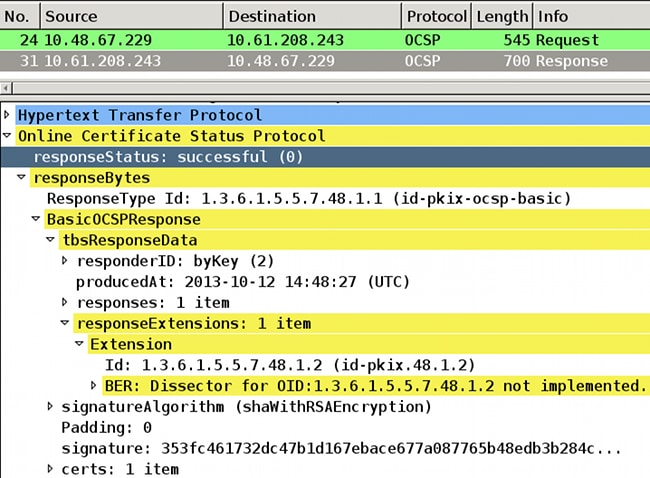
ASA VPN Remote Access with Multiple OCSP Sources
If a match certificate is configured as explained in ASA with Multiple OCSP Sources, it takes precedence:
CRYPTO_PKI: Processing map MAP sequence 10...
CRYPTO_PKI: Match of subject-name field to map PASSED. Peer cert field: =
cn=Administrator,cn=Users,dc=test-cisco,dc=com, map rule: subject-name
co administrator.
CRYPTO_PKI: Peer cert has been authorized by map: MAP sequence: 10.
CRYPTO_PKI: Found OCSP override match. Override URL: http://11.11.11.11/ocsp,
Override trustpoint: OPENSSL
When an OCSP URL override is used, the debugs are:
CRYPTO_PKI: No OCSP override via cert maps found. Override was found in
trustpoint: WIN2012, URL found: http://10.10.10.10/ocsp.
ASA VPN Remote Access with OCSP and Revoked Certificate
This procedure describes how to revoke the certificate and confirm the revoked status:
- Revoke the client certificate:
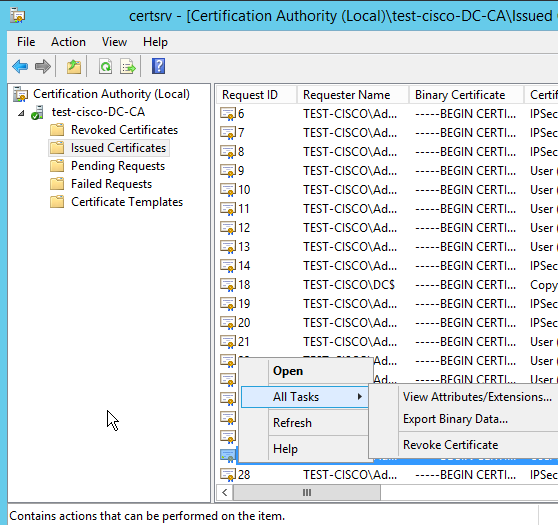
- Publish the results:
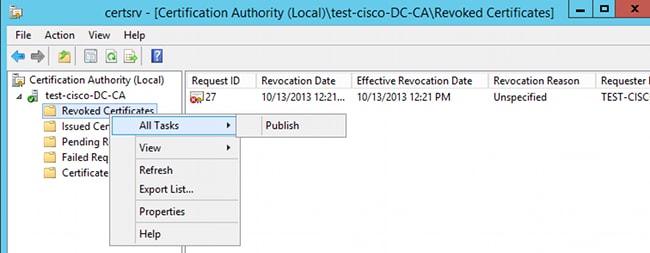
- [Optional] Steps 1 and 2 can also be done with the certutil CLI utility in Power Shell:
c:\certutil -crl
CertUtil: -CRL command completed succesfully. - When the client tries to connect, there is a certificate validation error:
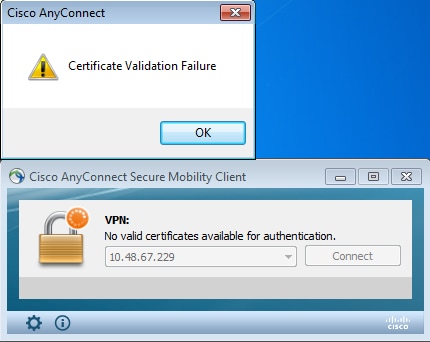
- The AnyConnect logs also indicate the certificate validation error:
[2013-10-13 12:49:53] Contacting 10.48.67.229.
[2013-10-13 12:49:54] No valid certificates available for authentication.
[2013-10-13 12:49:55] Certificate Validation Failure - The ASA reports the certificate status is revoked:
CRYPTO_PKI: Starting OCSP revocation
CRYPTO_PKI: OCSP response received successfully.
CRYPTO_PKI: OCSP found in-band certificate: serial number:
240000001221CFA239477CE1C0000000000012, subject name:
cn=DC.test-cisco.com, issuer_name: cn=test-cisco-DC-CA,dc=test-cisco,
dc=com
CRYPTO_PKI: OCSP responderID byKeyHash
CRYPTO_PKI: OCSP response contains 1 cert singleResponses responseData
sequence.
Found response for request certificate!
CRYPTO_PKI: Verifying OCSP response with 1 certs in the responder chain
CRYPTO_PKI: Validating OCSP response using trusted CA cert: serial number:
3D4C0881B04C799F483F4BBE91DC98AE, subject name: cn=test-cisco-DC-CA,
dc=test-cisco,dc=com, issuer_name: cn=test-cisco-DC-CA,dc=test-cisco,
dc=com
CRYPTO_PKI: verifyResponseSig:3191
CRYPTO_PKI: OCSP responder cert has a NoCheck extension
CRYPTO_PKI: Responder cert status is not revoked
CRYPTO_PKI: response signed by the CA
CRYPTO_PKI: Storage context released by thread Crypto CA
CRYPTO_PKI: transaction GetOCSP completed
CRYPTO_PKI: Received OCSP response:Oct 13 2013 12:48:03: %ASA-3-717027:
Certificate chain failed validation. Generic error occurred, serial
number: 240000001B2AD208B12811687400000000001B, subject name:
cn=Administrator,cn=Users,dc=test-cisco,dc=com.
CRYPTO_PKI: Blocking chain callback called for OCSP response (trustpoint:
WIN2012, status: 1)
CRYPTO_PKI: Destroying OCSP data handle 0xae255ac0
CRYPTO_PKI: OCSP polling for trustpoint WIN2012 succeeded. Certificate
status is REVOKED.
CRYPTO_PKI: Process next cert in chain entered with status: 13.
CRYPTO_PKI: Process next cert, Cert revoked: 13 - The packet captures show a successful OCSP response with the certificate status of revoked:
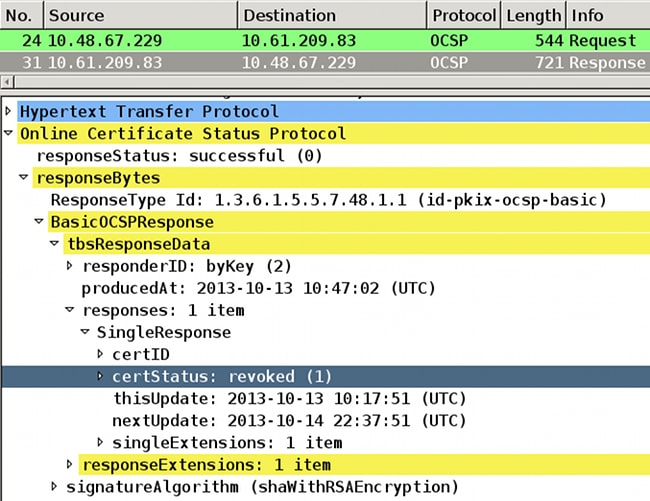
Troubleshoot
This section provides information you can use to troubleshoot your configuration.
OCSP Server Down
ASA reports when the OCSP server is down:
CRYPTO_PKI: unable to find a valid OCSP server.
CRYPTO PKI: OCSP revocation check has failed. Status: 1800.
Packet captures can also help with troubleshooting.
Time Not Synchronized
If the current time on OCSP server is older than on ASA (small differences are acceptable), the OCSP server sends an unauthorized response, and the ASA reports it:
CRYPTO_PKI: OCSP response status - unauthorized
When the ASA receives an OCSP response from future times, it also fails.
Signed Nonces Not Supported
If nonces on the server are not supported (which is the default on Microsoft Windows 2012 R2), an unauthorized response is returned:
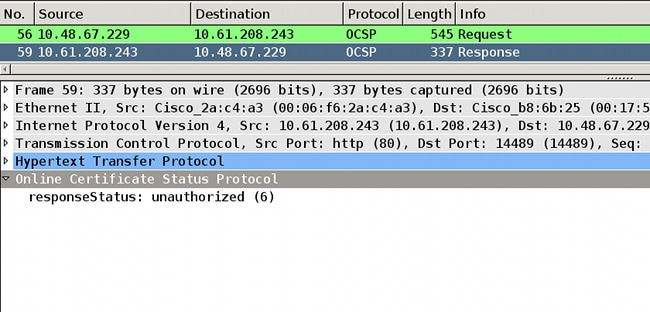
IIS7 Server Authentication
Problems with an SCEP/OCSP request are often the result of incorrect authentication on Internet Information Services 7 (IIS7). Ensure that anonymous access is configured:
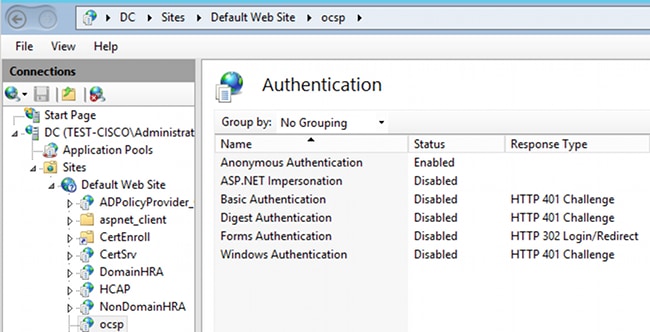
Related Information
Revision History
| Revision | Publish Date | Comments |
|---|---|---|
1.0 |
25-Oct-2013 |
Initial Release |
Contact Cisco
- Open a Support Case

- (Requires a Cisco Service Contract)



















 Feedback
Feedback